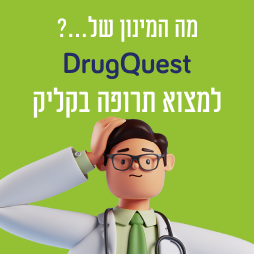Quest for the right Drug
סימולקט ® 20 מ"ג SIMULECT ® 20 MG (BASILIXIMAB)
תרופה במרשם
תרופה בסל
נרקוטיקה
ציטוטוקסיקה
צורת מתן:
תוך-ורידי : I.V
צורת מינון:
אבקה וממס להכנת תמיסה להזרקהאינפוזיה : POWDER AND SOLVENT FOR SOLUTION FOR INJECTION/INFUSION
עלון לרופא
מינוניםPosology התוויות
Indications תופעות לוואי
Adverse reactions התוויות נגד
Contraindications אינטראקציות
Interactions מינון יתר
Overdose הריון/הנקה
Pregnancy & Lactation אוכלוסיות מיוחדות
Special populations תכונות פרמקולוגיות
Pharmacological properties מידע רוקחי
Pharmaceutical particulars אזהרת שימוש
Special Warning עלון לרופא
Physicians Leaflet
Special Warning : אזהרת שימוש
4.4 Special warnings and precautions for use Patients receiving Simulect must be managed in facilities equipped and staffed with adequate laboratory and supportive medical resources including medications for the treatment of severe hypersensitivity reactions. Immunosuppressive regimens involving combinations of medications increase the susceptibility to infection, including opportunistic infections, fatal infections and sepsis; the risk increased with total immunosuppressive load. Simulect must not be administered unless it is absolutely certain that the patient will receive the graft and concomitant immunosuppression. Traceability In order to improve the traceability of biological medicinal products, the name and the batch number of the administered product should be clearly recorded. Hypersensitivity reactions Severe acute (less than 24 hours) hypersensitivity reactions have been observed both on initial exposure to Simulect and on re-exposure to a subsequent course of therapy. These included anaphylactoid-type reactions such as rash, urticaria, pruritus, sneezing, wheezing, hypotension, tachycardia, dyspnoea, bronchospasm, pulmonary oedema, cardiac failure, respiratory failure and capillary leak syndrome. If a severe hypersensitivity reaction occurs, therapy with Simulect must be permanently discontinued and no further dose be administered. Caution should be exercised when patients previously given Simulect are re-exposed to a subsequent course of therapy with this medicinal product. There is accumulating evidence that a subgroup of patients is at an increased risk of developing hypersensitivity reactions. These are patients in whom, following the initial administration of Simulect, the concomitant immunosuppression was discontinued prematurely due, for example, to abandoned transplantation or early loss of the graft. Acute hypersensitivity reactions were observed on re-administration of Simulect for a subsequent transplantation in some of these patients. Neoplasms and infections Transplant patients receiving immunosuppressive regimens involving combinations with or without basiliximab are at increased risk of developing lymphoproliferative disorders (LPDs) (such as lymphoma) and opportunistic infections (such as cytomegalovirus [CMV], BK virus). In clinical trials, the incidence of opportunistic infections was similar in patients using immunosuppressive regimens with or without Simulect. In a pooled analysis of two five-year extension studies, no differences were found in the incidence of malignancies and LPDs between immunosuppressive regimens with or without combination of basiliximab (see section 4.8). Vaccination No data are available on either the effects of live and inactive vaccination or the transmission of infection by live vaccines in patients receiving Simulect. Nevertheless, live vaccines are not recommended for immunosuppressed patients. The use of live attenuated vaccines should therefore be avoided in patients treated with Simulect. Inactivated vaccines may be administered to immunosuppressed patients; however, response to the vaccine may depend on the degree of the immunosuppression, therefore vaccination during treatment with Simulect may be less effective. Use in heart transplantation The efficacy and safety of Simulect for the prophylaxis of acute rejection in recipients of solid organ allografts other than renal have not been demonstrated. In several small clinical trials in heart transplant recipients, serious cardiac adverse events such as cardiac arrest (2.2%), atrial flutter (1.9%) and palpitations (1.4%) have been reported more frequently with Simulect than with other induction agents. Excipients with known effect This medicinal product contains less than 1 mmol sodium (23 mg) per vial, that is to say essentially ‘sodium-free’. This medicinal product contains potassium, less than 1 mmol (39 mg) per vial, i.e. essentially ‘potassium-free’.
Effects on Driving
4.7 Effects on ability to drive and use machines Simulect has no influence on the ability to drive and use machines.

שימוש לפי פנקס קופ''ח כללית 1994
לא צוין
תאריך הכללה מקורי בסל
01/01/2000
הגבלות
תרופה מוגבלת לרישום ע'י רופא מומחה או הגבלה אחרת
מידע נוסף
